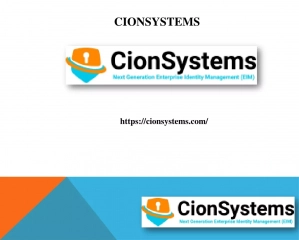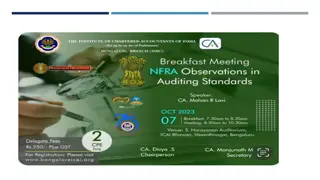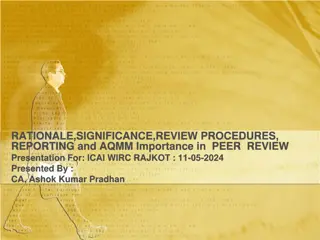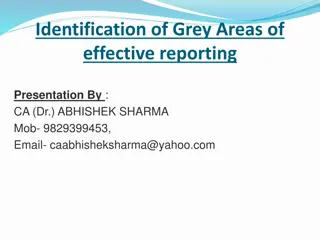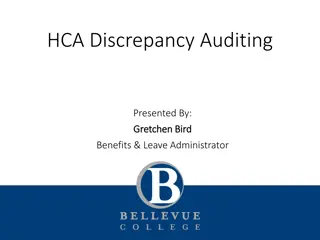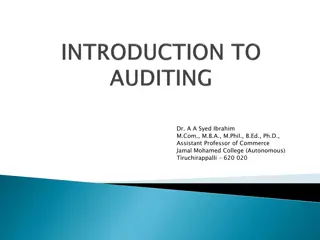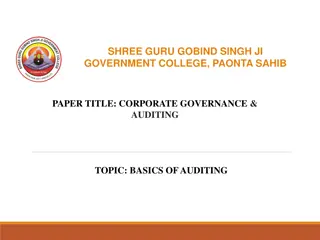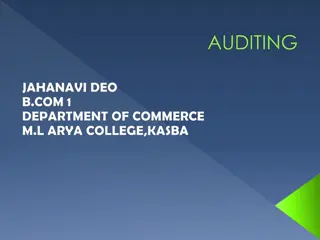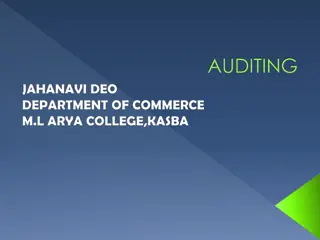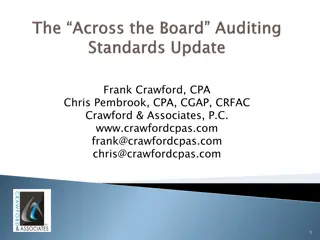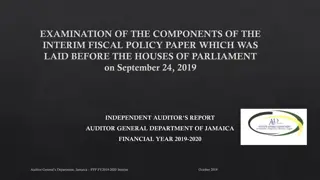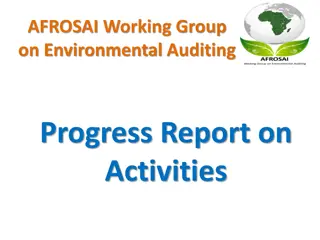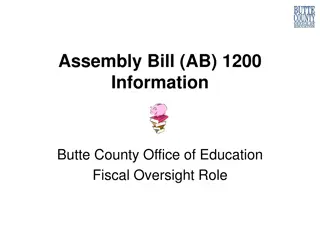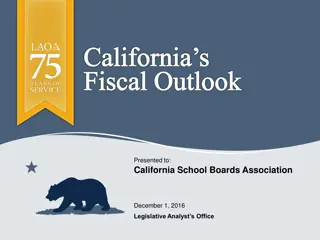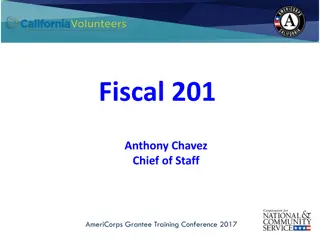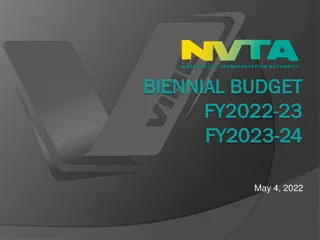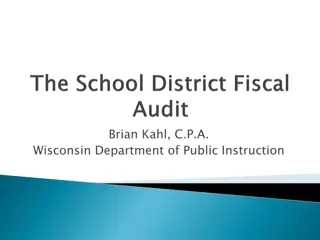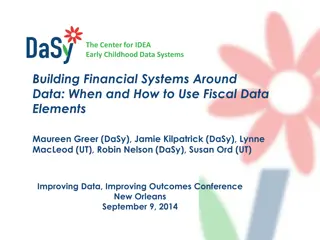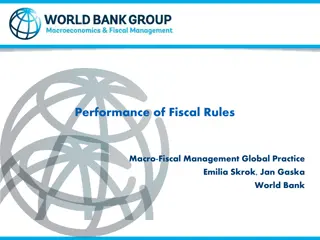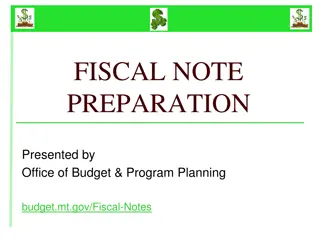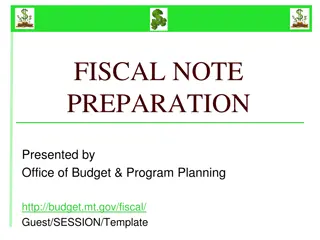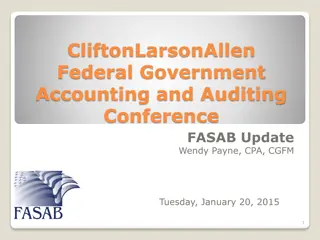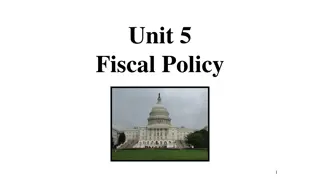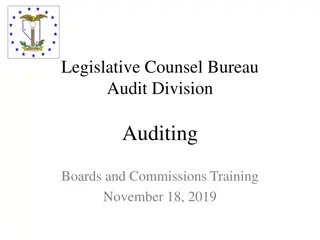ASQ Medical Device Auditor (CMDA) Exam | How to Prepare
Click Here---> https:\/\/bit.ly\/3OqYdTM <---Get complete detail on CMDA exam guide to crack Auditing. You can collect all information on CMDA tutorial, practice test, books, study material, exam questions, and syllabus. Firm your knowledge on Auditing and get ready to crack CMDA certification. Expl
8 views • 20 slides
Active Directory Auditing, cionsystems.com
A very simple and cost effective solution that makes active directory auditing easy proactively tracking and giving change alerts. https:\/\/rb.gy\/ttey9o
2 views • 7 slides
Relevance of Countercyclical Fiscal Policy and Fiscal Acyclicality
This literature review examines the effectiveness of countercyclical fiscal policies in stabilizing output and enhancing welfare, with a focus on the correlation between public spending cycles and GDP cycles. The study analyzes examples from Sweden and Argentina to showcase the impact of fiscal poli
2 views • 29 slides
Financial Reporting and Auditing Procedures for Governor's Office of Elderly Affairs
This document outlines the financial reporting and auditing procedures followed by the Governor's Office of Elderly Affairs (GOEA). It includes details on monthly, quarterly, and annual financial reports, budget approvals, audit reviews, funding history, and specific requirements for various program
0 views • 18 slides
Importance of Public Sector Auditing in Enhancing Accountability and Governance
The Auditor-General of South Africa plays a critical role in strengthening democracy through auditing public sector institutions. Public sector auditing ensures compliance, performance evaluation, and governance transparency, ultimately building public confidence. Key stakeholders include government
1 views • 11 slides
Understanding Auditing in Commerce: Key Concepts and Objectives
Auditing in commerce involves the systematic examination of financial, operational, and compliance information to ensure accuracy and conformity to standards. Learn about the definition, key objectives, types of audits, the audit process, auditor's responsibilities, and duties of an auditor.
7 views • 13 slides
Evolution of Auditing in Industry 4.0
The evolution of auditing from manual tools to semi-automated processes in Industry 4.0 is explored in this content. Audit 4.0 utilizes technologies like IoT, CPS, and smart factories to collect data for real-time assurance, marking a significant shift in audit methodologies towards efficiency and e
0 views • 31 slides
Understanding the Impact of Sections 143(9) and 143(10) of Companies Act, 2013
Exploring the significance of Sections 143(9) and 143(10) of the Companies Act, 2013, and their implications on active regulators, worried investors, and normal auditors. The session delves into defending past audits, highlights auditing standards in India, and provides insights into regulators' obs
0 views • 54 slides
Understanding Auditing: Meaning, Differences from Accounting, and Qualities of an Auditor
Auditing involves a systematic examination of financial records to ensure accuracy, while accounting focuses on recording and interpreting financial transactions. Learn about the origins of auditing, key differences from accounting, qualities required in an auditor, and the scope and objectives of a
1 views • 7 slides
Importance of Peer Review in Enhancing Assurance Services and Regulatory Compliance
Peer review plays a crucial role in strengthening public confidence in financial reporting, ensuring audit effectiveness, and maintaining quality across auditing firms. It helps bridge the gap between expected and actual service quality, restores public trust, and supports regulatory adherence. The
1 views • 31 slides
Comprehensive Energy Conservation and Auditing in Dairy Industry
Energy conservation, auditing, and efficiency play crucial roles in reducing production costs, improving environmental impact, and ensuring sustainability in dairy industrial plants. Through energy auditing, data is collected, energy losses are identified, and measures are implemented to save costs
0 views • 16 slides
Key Aspects of Effective Reporting in Auditing & Corporate Governance
Effective reporting in auditing involves identifying grey areas, exercising due professional care, detecting material misstatements, and ensuring corporate governance. Auditors must be vigilant, apply their skills diligently, and provide reasonable assurance to stakeholders. Corporate governance pla
0 views • 27 slides
HCA Discrepancy Auditing Process Overview
Discover insights on HCA discrepancy auditing presented by Gretchen Bird, the Benefits & Leave Administrator. Gain valuable tips on running reports, handling discrepancies, and utilizing tools for effective auditing. Understand the significance of disclaimers, different types of discrepancies, runni
0 views • 10 slides
Evolution and Significance of Auditing in Commerce
Auditing, derived from the Latin term "audire," has a long history dating back to ancient civilizations. It plays a crucial role in verifying financial information and ensuring transparency in business operations. The process involves systematic examination of accounts to provide a true and fair vie
6 views • 17 slides
Basics of Auditing in Corporate Governance and its Origins
Auditing involves the examination of financial statements to ensure accuracy and reliability. The practice dates back to the early 20th century in India, with a focus on verifying accounting records for transparency. Various definitions and perspectives on auditing are discussed, emphasizing the imp
0 views • 28 slides
Importance of Vouching in Auditing: The Backbone of Detecting Errors and Frauds
Vouching plays a crucial role in auditing by checking evidential documents to detect errors, frauds, and ensure the accuracy and reliability of financial statements. It is essential for proving the fairness of results and detecting planned frauds. Through vouching, auditors can validate transactions
0 views • 7 slides
Understanding Vouchers in Auditing: A Comprehensive Guide
Learn about primary and collateral vouchers, examples of different types of vouchers like cash receipts, cash payments, purchases, and sales, and their importance in auditing processes. Images and descriptions provided for better understanding.
0 views • 6 slides
Enhancing Fiscal Policy Planning through Public Participation and Transparency
Explore the importance of public participation and meaningful transparency in fiscal policy planning and public expenditure management. Learn about the GIFT Network, its champions and stewards, and how fiscal transparency and public participation can lead to improved fiscal and development outcomes
0 views • 22 slides
Fiscal Policy Guidance for State Long-Term Care Ombudsmen
Overview of the fiscal management responsibilities for State Long-Term Care Ombudsmen under the Older Americans Act requirements. Covers topics such as fiscal management, funding allocations, state plan requirements, and fiscal responsibilities. Details the OAA and LTCOP rule provisions related to f
6 views • 22 slides
Overview of Recent Auditing Standards and Guidance
The content discusses recent developments in auditing standards, including the release of SAS 145 by the AICPA and an Audit Guide on Risk Assessment. It also highlights various SAS numbers, topics, effective dates, and sections affected, providing insights into the evolving landscape of auditing pra
0 views • 76 slides
Principles of Fiscal Deficits and Debt Management According to Kalecki
Economist Kalecki advocated for a permanent regime of fiscal deficits to manage public debt, emphasizing the importance of debt management for liquidity in the financial system. His principles involve splitting the government budget into functional and financial parts, each influencing aggregate dem
0 views • 6 slides
Examination of Interim Fiscal Policy Paper for Financial Year 2019-2020
An independent auditor's report on the interim fiscal policy paper laid before the Houses of Parliament, confirming compliance with the requirements of the FAA Act. The report assesses the components, conventions, and assumptions underlying the paper for fiscal responsibility, macroeconomic framewor
1 views • 15 slides
Progress Report of AFROSAI Working Group on Environmental Auditing Activities
The AFROSAI Working Group on Environmental Auditing has made significant progress by adopting a work plan, setting objectives, and focusing on strategic pillars such as training, research projects, cooperative audits, and communication. The group aims to provide suitable products to SAIs, increase i
0 views • 25 slides
Butte County Office of Education Fiscal Oversight Role Overview
The Assembly Bill (AB) 1200 provides insights into the fiscal oversight role of Butte County Office of Education (BCOE). It outlines the responsibilities of local boards of education, BCOE as an intermediary agent, and the creation of the Financial Crises and Management Assistance Team (FCMAT) in 19
0 views • 12 slides
California's Fiscal Outlook Presentation to California School Boards Association
California's fiscal outlook was presented to the California School Boards Association by the Legislative Analyst's Office in December 2016. The report highlights a decrease in revenues and expenditures for the 2016-17 fiscal year, leading to a revised reserve down by $1 billion. However, the state i
0 views • 22 slides
AmeriCorps California Volunteers Fiscal Training Conference 2017 Details
In July 2017, the AmeriCorps Grantee Training Conference took place, focusing on fiscal procedures, compliance, desk reviews, and monitoring. The conference covered topics such as improper payments elimination, common audit findings, and the fiscal desk review process implemented by California Volun
2 views • 22 slides
Fiscal Fundamentals for Administrative Services - Overview and Compliance Requirements
Explore the essential fiscal fundamentals for Administrative Services including regulatory compliance requirements, funding sources overview, and state reporting insights. Learn about accounting principles, auditing standards, oversight practices, and fund types. Stay informed and engaged in achievi
0 views • 17 slides
Understanding Auditing: Types, Objects, and Differences Explained
Auditing in the field of commerce involves verifying accounts and statements to ensure accuracy and compliance, with a focus on detecting errors and frauds. This content covers the main and subsidiary objects of auditing, types of audits such as statutory and internal audits, and the differences bet
0 views • 19 slides
Fiscal Year 2023 Budget Overview
The content presents detailed information on the fiscal year 2023 budget, including budget cycles, comparisons between fiscal years, source of funds, expenditure plans, and top projects for the Consolidated Municipal Agency (CMA). It covers budget development processes, funding sources, expenditure
0 views • 11 slides
Auditing Standards and Requirements in Wisconsin Department of Public Instruction
Understanding the auditing standards and requirements for financial statements audits in the Wisconsin Department of Public Instruction, including the role of management, statements on auditing standards, independence criteria, technical training needed for auditors, and services performed by indepe
3 views • 70 slides
Emerging Markets Investors Alliance and GIFT: Promoting Fiscal Transparency
The Emerging Markets Investors Alliance, in partnership with GIFT (Global Initiative for Fiscal Transparency), aims to educate institutional investors about fiscal transparency and facilitate investor advocacy with governments. Through roundtable discussions and engagements with finance ministers, t
0 views • 5 slides
Understanding Fiscal Reports and Budgeting Process
Dive into the world of fiscal reports and budgeting with a presentation led by Stephanie Dirks. Explore the Budget Code Story, different types of reports, and examples of Fiscal 04 & Fiscal 06 reports. Learn about Fund allocations, Object Codes, and responsible oversight of funds. Get insights into
0 views • 17 slides
Building Financial Systems Around Fiscal Data in Early Childhood Programs
Understand the importance of fiscal data in program management, identify key fiscal data elements, address policy questions, and learn from a state's cost study design. Explore the significance of fiscal data for decision-making, policy development, and program management, with a focus on revenue so
0 views • 31 slides
Global Practices in Fiscal Rule Performance
The study explores the implementation and impact of fiscal rules on macro-fiscal management, focusing on international experiences. It discusses the presence and compliance with fiscal rules, highlighting differences in pro-cyclicality among small and large countries. The rise in adoption of nationa
0 views • 23 slides
Understanding Fiscal Notes in Government Legislation
Fiscal notes are essential documents accompanying bills affecting finances of state entities. They detail revenue, expenditure, and fiscal impact, requiring a 6-day processing timeline. The need for a fiscal note may be determined by legislative services, committees, sponsors, or agencies. The proce
1 views • 30 slides
Fiscal Note Preparation Process and Guidelines
Fiscal notes are essential for bills affecting state finances. This includes the total processing time, exceptions, and what to do if there is disagreement on the fiscal note. The process involves multiple steps, including drafting, review, and resolution of disagreements. The President of the Senat
0 views • 29 slides
Federal Government Accounting and Auditing Conference Update
CliftonLarsonAllen presents the Federal Government Accounting and Auditing Conference update, discussing topics such as fiscal sustainability, fiscal projections, social insurance, and standards-setting over the past 25 years. The event highlights important projects related to risk, assumed leases,
0 views • 31 slides
Understanding Government Tools for Economic Stability
The government uses fiscal and monetary policies to stabilize the economy. Fiscal policy involves Congress's actions through government spending or taxation changes, while monetary policy is driven by the Federal Reserve Bank. Discretionary fiscal policy involves new bills designed to adjust aggrega
0 views • 36 slides
Importance of Government Auditing and Fiscal Oversight for Boards
Government auditing plays a crucial role in ensuring accountability to legislators and the public, with divisions like the Legislative Counsel Bureau Audit Division and the Executive Branch Division of Internal Audits conducting thorough reviews. Fiscal oversight is particularly important for boards
0 views • 15 slides
Importance of Logging and Auditing in Cybersecurity
Discussing the significance of logging and auditing in cybersecurity, emphasizing the need for both a priori and a posteriori techniques to prevent security violations. Logging helps record events for system analysis, while auditing involves analyzing log records to provide understandable system inf
0 views • 32 slides

